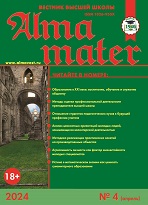UDC 378(1-25):811.111
https://doi.org/10.20339/AM.01-22.073
Victoria A. Goncharova,
Cand.Sci. (Pedagogy), Associate Professor
at Institute of Foreign Languages
of Moscow City Pedagogical University,
e-mail: v-goncharova@yandex.ru
The modern educational process in the field of intercultural foreign language education becomes controversial in terms of content (the need to understand the native culture as, first of all, a manifestation of the regional culture) and the organization of training (the need to transform the mediated, formal intercultural communication in the audience in direct interpersonal interaction with the acquisition of personal experience of the activity). On the other hand, the training of teachers in the field of language education involves a request for the development of non-linear and unsupported thinking of graduates, the formation of their ability to work with the future at the levels of design and methodological analysis. As a result of the complexity of the goal, there is a need to find new resources and ways of educational activities. The article is based on the thesis that it is possible to link the professional-pedagogical (methodological) and subject-communicative training of the modern foreign language teacher within the framework of an appropriate resource for this purpose — the urban educational environment. To substantiate the proposed thesis, the author analyzes the system of requirements for the professional training of the modern teacher of foreign languages, formulates the connection between intercultural foreign language education and the city. From the standpoint of educational urbanistics, the city is regarded as an educational multidimensional environment for professional and communicative training of the future teacher of English. Anthropopractice is defined as the main method for such training, and playing games can be the leading technique. The case of the Moscow educational environment helps to exemplify the components of the content of professional pedagogical training of EL teachers (within the intercultural approach).
Key words: professional and pedagogical training, intercultural foreign language education, educational urbanistics, urban educational environment, content of education.
References
- Goncharova, V.A., Alpatov, V.V. Intercultural wonderland: experience of integration of national culture into Russian foreign language education at higher school. Alma Mater. Vestnik ysshei shkoly. 2017. No. 9. P. 110–115. DOI: 10.20339/AM.09-17.110
- Goncharova, V.A., Alpatov, V.V. Moscow megapolis as an educational environment in the system of intercultural foreign language education. Alma Mater: Vestnik ysshei shkoly. 2021. No. 4. P. 27–33. DOI: 10.20339/AM.04-21.027
- Guruleva, T.L. Specific principles of Chinese Language teaching in the cross-cultural paradigm of language education. Foreign Languages at Schoo. 2020. No. 4. P. 54–60.
- Kovaleva, T.M., Jakubovskaja, T.V. Tjutorial activity as anthropopractice: between individual educational trajectories and individual educational programs. “Man.Ru”. Humanitarian Almanac. 2017. No. 12. P. 85–94.
- Nikitin, V.A. The Essence of education. Kiev: Optima, 2019. 266 p.
- Rozin, V.M. Concept and types of anthropopractices. “Man.Ru”. Humanitarian Almanac. 2017. No. 12. P. 13–33.
- Safonova, V.V. The topical problems of teaching Methodology in Postgraduate education within the cross-cultural paradigm of language education (language university / language faculties). Foreign Languages at School. 2016. No. 3. P. 2–12.
- Chernyaeva, I.V. Communicative-activity approach in the intercultural paradigm of language education. In: Science today: history and modernity: materials of International conference, Moscow: Marker, 2017. P. 127–133.
- Shevelev, A.N. Methodological approaches of modern educational urbanity. Continuing Education. 2015. Vol. 3. No. 13. P. 75–89.
- Haar, Sh. The City as Campus: Urbanism, and Higher Education in Chicago. University of Minnesota Press, 2011. 280 p.
- Konuk, N., Turam, N. Gamze, Ardali, Yu. The importance of Urbanization in Education. ICRES 2016: International Conference on Research in Education and Science. The Eurasia Proceedings of Educational and Social Sciences (EPESS). 2016. Vol. 5. P. 232–236.
- Perovic, S. Collaborative Research and urban educational discourse in contemporary higher education. Procedia. Social and Behavioral Studies. 2014. No. 116. P. 4559–4563.











.png)






